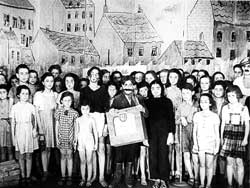After World War I, progressive music in Germany moved in two directions. Schoenberg and his innovations in atonal harmony formed one path, followed by one of his enthusiastic students, Viktor Ullmann (1898–1944), who honored his teacher with an orchestral Variations and Double Fugue on a Piano Piece of Schoenberg. Hans Krasa (1899–1944), on the other hand, turned for inspiration to popular theater, influenced by Brecht and Weill, American jazz, and Tin Pan Alley.
Both these styles, experimental and populist, fell afoul of the Third Reich. “Degenerate” was the term used for any music deemed a threat to the purity of Deutsche Kunst. Ullmann and Krasa were also both Jewish and ended up as two of the 141,000 deportees to Terezin, the “model camp” set up in 1941 by the Nazis as a coldly cynical re-creation of a Jewish urban ghetto. Both composers contributed to the camp’s musical life, which ranged from coffeehouse cabaret songs to classical recitals to opera. And by coincidence, a work by each composer—one performed in Terezin, one written there that lay silent for decades—is being staged in Seattle this week and next.
Black Box Opera Theater is performing Ullmann’s The Emperor of Atlantis alongside cabaret songs by Weill and Korngold as part of an evening of proscribed music. On hand to direct the production is Rhoda Levine, who directed Emperor‘s premiere for Netherlands Opera in 1975. Emperor, she reports, was slated for performance in Terezin, but after Adolf Eichmann attended a rehearsal, the production was canceled.
Small wonder. Emperor is the blackest of black comedies. Death, offended by the title dictator’s arrogating of his power over people’s lives, goes on strike. No one can die. Even war casualties linger horribly until Emperor Overall pleads with Death himself, who agrees to resume his duties—as long as the Emperor sacrifices himself as the first victim.
Neither Peter Kien’s libretto nor Ullmann’s score takes much care to conceal the opera’s allegorical intent. There’s a minor-key quotation from “Deutschland Über Alles,” in case anyone didn’t understand how the Emperor got his name, and the final chorale’s derivation from Luther’s “A Mighty Fortress Is Our God” is unmistakable. The hymn’s phrases are soured, slightly tilted, but still somber and poignant. In between, Ullmann interjects ragtimey, Kander-and-Ebb riffs for the violin, accompanied by tinkling harpsichord.
Ullmann further pushed the Reich’s buttons by including chaotic passages reminiscent of his teacher’s music at its angstiest. Add sneering, sardonic marches and fanfares and a Straussian love duet, and you have one of the most chilling, provoking, don’t-give-a-fuck musical scores ever written. Before his deportation to Auschwitz in 1944 (on the same train as Krasa and another Terezin composer, Gideon Klein), Ullmann wrote, “By no means did we sit weeping . . . our endeavor with respect to art was commensurate with our will to live.” Perhaps. But the music of Emperor is the bitter utterance of a man who has nothing left to live for but art.
Even the manuscript is a spit in the Reich’s eye; due to the lack of music paper, reports Levine, Ullmann used any scrap he could find on which to jot his ideas, including entrance forms for those brought to Terezin—the records of evil bureaucracy recycled in the service of art. Amazingly, this score survived. Before he left Terezin, Ullmann entrusted his papers to a friend of his, who after the camp’s liberation in May 1945 gave them to a Dr. H.G. Adler, who kept the Emperor manuscript with him in England for 30 years. A chance encounter between Adler and conductor Kerry Woodward led to that Netherlands premiere. Since then, Levine has staged the opera around the world, from an Israeli kibbutz to San Francisco.
Faintly allegorical, too, is Krasa’s half-hour opera Brundibár, to be played in concert twice next week by Music of Remembrance. It’s a tale of two resourceful children who, trying to earn money to buy milk for their ailing mother, battle the ogreish title character. Krasa wrote it in 1938 for a Jewish boys’ orphanage in Prague. But as the deportations began, production plans were disrupted until Krasa and his associates decided to revive it inside Terezin. The lively piece became something of a hit—despite the fact that for each performance new child singers had to be recruited to replace the ones sent to Auschwitz. Present for both performances next week will be Ela Stein Weissberger, a survivor from the Terezin production. She played the role of the Cat in all 55 performances.
These performances are in preparation for MoR’s recording of the opera for Naxos, using Tony Kushner’s English adaptation. Kushner’s libretto and his 2003 storybook version with illustrations by Maurice Sendak have revived interest in the work. The score, full of folky tunes and oom-pah accompaniments suitably uncomplicated for child performers, shows Krasa as a deft assimilator of between-the-wars popular music, adding sly dashes of big band and Broadway—that is, borrowing back the light-music idioms that Jewish composers like Gershwin and Berlin brought from Europe and stirred together with other voices from the American melting pot.







